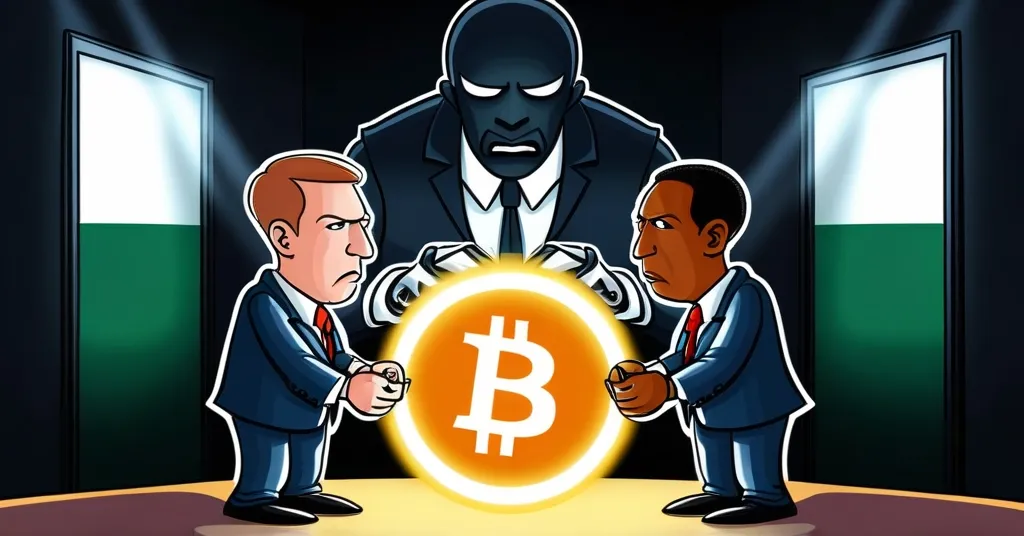Binance Exec’s 8-Month Ordeal: $150M Crypto Bribe Demand in Nigeria

A Mickey Mouse Operation: Binance Exec Talks About Detention And Alleged $150M Crypto Bribe
Tigran Gambaryan, a high-ranking executive at Binance, was detained in Nigeria for eight months following a meeting with officials from the Department of State Services (DSS), Nigeria’s national intelligence agency, and the Economic and Financial Crimes Commission (EFCC), responsible for investigating financial crimes. This ordeal involved a shocking demand for a $150 million bribe, payable in cryptocurrency, which Gambaryan described as a “Mickey Mouse operation.”
- Gambaryan detained for eight months after February 2024 arrest
- Nigerian officials allegedly demanded $150 million bribe in cryptocurrency
- Accusations of corruption and incompetence leveled against DSS and EFCC
Gambaryan, Binance’s VP of Global Intelligence and Investigations, found himself in a situation straight out of a Hollywood thriller. After being arrested in February 2024, he detailed how a seemingly routine meeting with Nigerian officials took a sinister turn. “As you may already know, this ended with them asking for a $150 million bribe, paid in cryptocurrency into their personal wallets. A Mickey Mouse operation at its best,” Gambaryan recounted, underscoring the audacity of the demand.
The bribe, payable in digital currencies like Bitcoin or Ethereum, was just the beginning of the troubles faced by Gambaryan and his colleague, Nadeem Anjarwalla, Binance’s regional manager based in Kenya. In a twist fit for a spy novel, Anjarwalla managed to escape custody, leading to a chaotic aftermath that saw innocent EFCC detectives wrongfully detained. Gambaryan’s criticism didn’t stop there; he accused EFCC officer Hamma’Adama Bello of being willing to fabricate evidence to keep the Binance executives detained.
“If anyone should have been detained, it was Belloji, for multiple basic law enforcement failures, incompetence, and negligence.”
The Nigerian authorities’ demands extended beyond the bribe, allegedly seeking to violate international privacy laws by requesting user data on all Nigerians. This move, if true, raises significant concerns about the misuse of power and the erosion of privacy rights in the digital age. Gambaryan’s account exposes not just the greed and incompetence of certain officials but also the broader challenges faced by the cryptocurrency industry in regions with high corruption risks.
The fallout from these events has been profound. The once-strong working relationship between Binance and Nigerian law enforcement has deteriorated, complicating the company’s operations in the region. This situation reflects the global trend of increasing regulatory scrutiny and crackdowns on cryptocurrency exchanges, with Nigeria being particularly aggressive towards Binance. The Nigerian government’s devaluation of the naira and its subsequent blame on platforms like Binance have only intensified the conflict.
Despite the Nigerian government’s denial of Gambaryan’s allegations and their urging for the public to disregard them, the incident has had significant diplomatic repercussions. The U.S. imposed visa restrictions on Nigeria’s delegation to the UN General Assembly, and President Joe Biden refused to meet with Nigerian President Bola Tinubu until the situation was resolved. These actions underscore the international dimension of the conflict and highlight the potential for broader legal repercussions against implicated Nigerian officials.
Experts have expressed concern over the potential for corruption within the cryptocurrency industry, emphasizing the need for greater transparency and accountability. Gambaryan’s ordeal not only highlights the challenges of navigating the crypto space in Nigeria but also underscores the broader struggle for regulatory clarity and ethical conduct in the decentralized world of cryptocurrencies.
As we champion the principles of decentralization and privacy, incidents like these remind us of the vigilance required to protect these values. They also reinforce the need for decentralized systems like Bitcoin, which promote privacy and freedom, and may even accelerate the adoption of such technologies in response to centralized corruption.
Key Takeaways and Questions
- What led to the detention of Tigran Gambaryan?
Gambaryan was detained as part of Nigeria’s crackdown on Binance, following a meeting with Nigerian officials where a $150 million bribe was demanded.
- How did Nigerian authorities allegedly attempt to extort Binance?
They set up a fake meeting with media and cameras to demand a $150 million bribe in cryptocurrency.
- What was the role of the Department of State Services (DSS) in this incident?
The DSS was involved in the meeting that preceded the bribe demand, allegedly setting the stage for the extortion attempt.
- What accusations did Gambaryan make against the EFCC?
He accused them of greed, incompetence, and attempting to fabricate evidence to detain Binance executives, as well as trying to violate international privacy laws.
- How has this incident affected Binance’s relationship with Nigerian law enforcement?
It has severely deteriorated the once-strong working relationship, complicating matters further for Binance in Nigeria.



